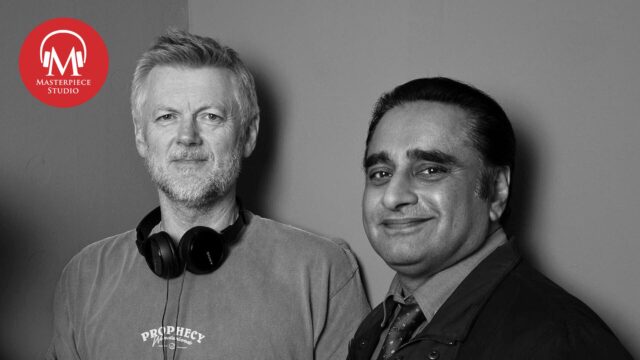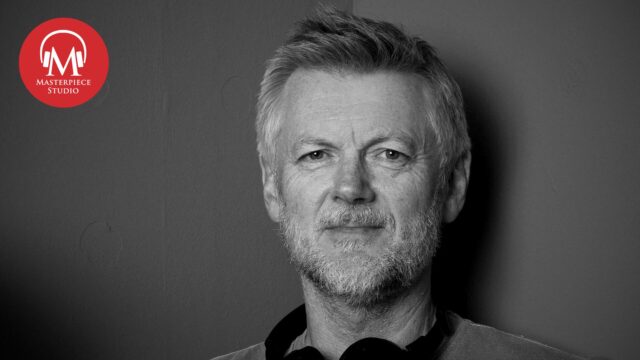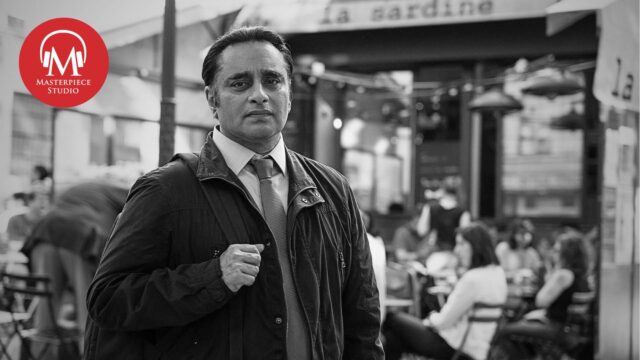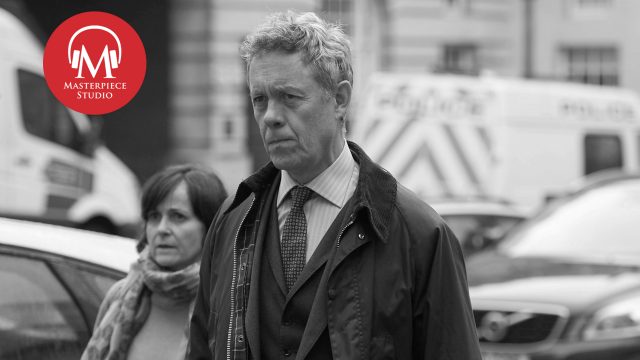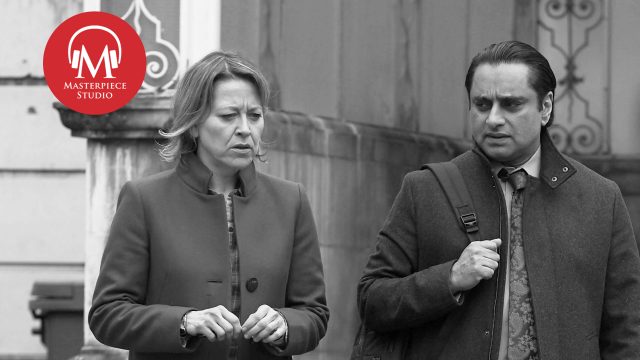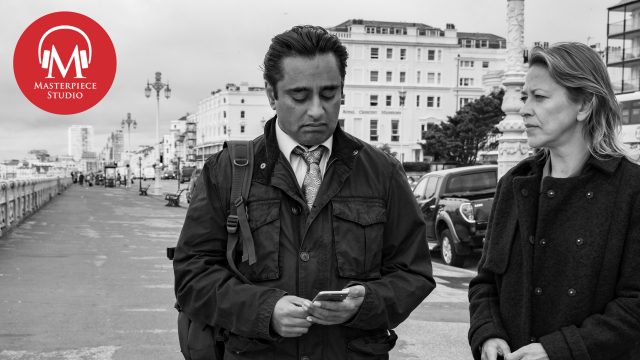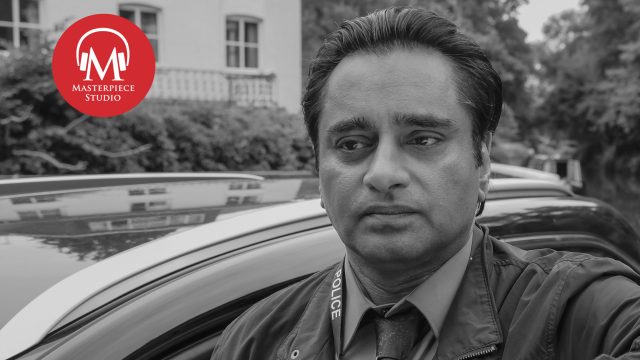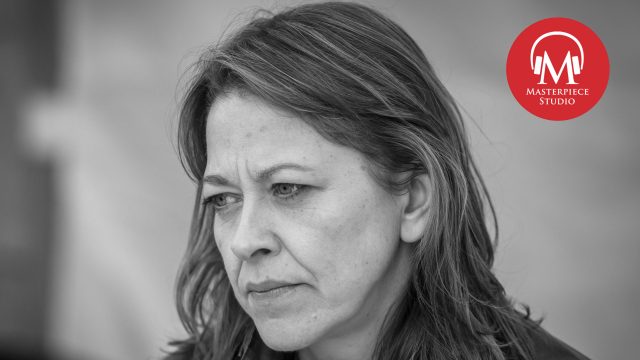The truly tragic ending of the fourth season of Unforgotten made series creator and head writer Chris Lang tear up as he wrote it. Lang talks through the twisty fourth season of his series, and looks ahead to what’s in store for the planned fifth season of his modern day crime drama.
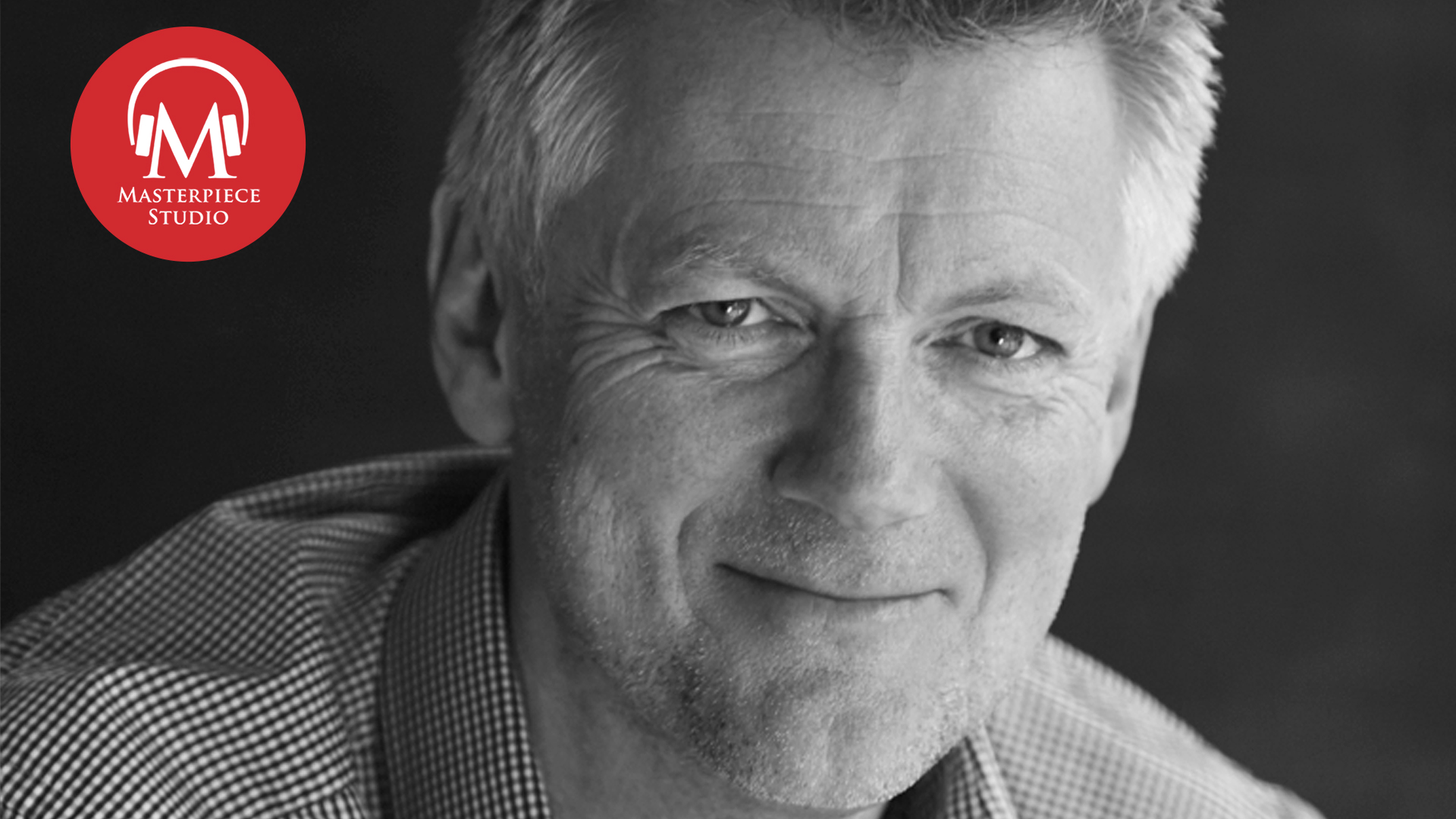

Chris Lang Made Himself Cry By The End Of ‘Unforgotten’ Season Four
Released 36:13
Related to: Unforgotten, Season 4
Download and subscribe on: iTunes | Spotify| RadioPublic
Transcript
Jace Lacob: I’m Jace Lacob, and you’re listening to MASTERPIECE Studio.
Before we go any further, I have to warn you — if you haven’t watched all of Season Four of Unforgotten, please do NOT listen to the rest of this episode.
We usually try to limit our plot spoilers on this podcast, but with the shocking ending of episode six of this season, we’d hate for this to be where you hear what happened. All six episodes of Unforgotten season four are available now on PBS Passport — go watch, and then come back here.
Okay then. Now: DCI Cassie Stuart is dead.
CLIP
Sunny: So we’ve come together today, to say, all of us in our different ways, goodbye to our beloved Cass.
Jace It’s a devastating end to a traumatic season of Chris Lang’s already gritty crime drama, featuring a nuanced exploration of murder and, this time, among a team of former police academy graduates.
CLIP
Liz For what it’s worth, I did always think it was an accident, Sir. Not that’s any excuse. But’s it’s been exhausting, running from my appalling mistakes all these years. And when I come out of prison, I hope I can live a simpler life….
Jace For Unforgotten fans, the tragedy of the final episode is barely lifted by the news that this season finale is just that — a fifth go-round is in the works.
CLIP
Sunny So we can be sad, that we’ve lost someone we adored, and who we will miss every day, but we can also be grateful for the time we did have with her, and for the impact she had on all our lives. Cass Stuart was my colleague, she was my mentor, she was my friend. And I loved her.
Jace Series creator Chris Lang returns to the podcast to discuss his heavy fourth season, what’s still to come for the now-solo DI Sunny Khan, and the value of a realistic internal examination of the police force itself in a crime-solving drama like this.
Jace And this week we are joined once again by Unforgotten creator, Chris Lang. Welcome.
Chris Lang Thank you.
Jace Before we get into the specifics of this series’ case, I do want to talk about the elephant in the room, namely the departure of Nicola Walker from Unforgotten. When in the process, did you know that you’d be tying up Cassie’s story in the series?
Chris Probably somewhere between series two and three. It was a kind of ongoing discussion between us, between Nicola and I, and it was about neither of us, I guess, wanting to become complacent, neither of us wanting to do something simply because it was easy or easier. We discussed various iterations of how she should leave, and in the end, I think we both wanted to do something that was final. So neither of us allowed ourselves to be tempted to take a slightly easier route, perhaps.
Jace I mean, there is a sense, if Cassie does retire, that there is a sense of yearning, perhaps on the part of the viewer, that maybe she could be pulled back into things in a subsequent season. Instead, there is a sense of finality to Cass’s story here. The penultimate episode ended with Cassie’s car accident and the implication that one of the suspects at the heart of this story, Liz, Dean, Rom or Fiona, could have been behind it. But the truth is actually less sensational, but far messier and more random. Was this a deliberate red herring to amp up tension, only to puncture it with the reveal?
Chris Yeah, completely. It was to subvert the genre, really. You know, it was structured very deliberately in that you saw her getting into her car. And then I deliberately had four cutaways to the other four suspects in their car. And we then learned it was nondescript. I even got design right at the beginning to choose similar looking 4x4s. They were largely sort of family people. So I wanted it to be absolutely the audience going, ‘Well, it’s one of them,’ and I obviously wanted to do that deliberately, then highlight the opposite, which was sort of pathetic conclusion to her life — random, bad chance to a degree occasioned by the emotional state she found herself in, you know, her exhaustion her mental exhaustion or distraction. But really, largely it’s just the random cruelty of life. And, you know, in many ways that felt like a fairly fitting end and an interesting sort of echo of some of the themes of the whole four series up until that point.
Jace I mean, it does the accident injects this notion of sort of randomness of causality into Unforgotten, which is a show sort of about deliberate actions and inadvertent consequences. Life feels messier somehow with the randomness of Cassie’s death. There is a sense of chaos that’s introduced here that was really heartbreaking to watch, because it wasn’t one of these suspects we’ve been watching. It is something that could happen to any one of us. Watching it during the pandemic, I think, especially sort of heightened that sense of chaos. You know, can you speak more about the sort of chaotic element that that introduced in terms of the writing?
Chris Yeah, well, it’s something, but it’s sort of close to my heart, having experienced it in my life, the random, brutal cruelty of life and how it can be snatched away from you when you have no expectation that it’s coming. So I think it’s but it’s also something I think that everyone can relate to. and you rightly say that a number of the cases and the suspects in all cases have acted more deliberately and there and the chaos that follows in their lives is more often the result of deliberate actions, to a degree, also, there’s a random element to their lives. It’s that sort of sense of, you know, you teeter on the edge off of something and the choices you make in the end could lead down a thousand different routes. And there’s a slightly random, chaotic element to all of our lives, but certainly to the suspects as well. So I think it does chime with the general, one of the general themes, but certainly in her life, it seems, a cruelly random way to die and yet still connected, you know, it always had to have truth behind it. The roots of the accident came from her emotional and physical exhaustion from what 30 years of policing had taken from her.
CLIP
Lingley And you’re sure there are no connections he’s concealed?
Carter The kid’s a career car thief, he’s not a hit man.
Lingley Okay, thanks, Mike, speak soon. Err… So the other car, a Range Rover they now know, was driven by a 24 year old car thief who’d only nicked it five minutes before. Tire marks on the road support his claim that he braked hard. He said she just pulled out in front of him.
Sunny Jesus.
Jace I mean, that is the thing that really hit home with me. Unforgotten is in many ways sort of the most humanistic mystery on television, and it does show the damage — physical and psychological — that crime creates to the victim, to their families, to the perpetrator or perpetrators. But it has also explored the emotional toll that Cassie has carried with her for, as you say, sort of 30 years of policing, that it does in some way feel like an inevitable ending for her character. More than simply retiring, there has to be some kind of break. And we see her struggle with that over the course of this series, but this ending feels in some ways emotionally right.
Chris Yeah, it was it was very tough. And as I said earlier, that I deliberately made it uncomebackable from for the reasons I already said. Two things first of all, I wanted to write a series where your protagonist, your hero, didn’t want to be there, did not want to do the job. I thought that was a really interesting dynamic. But I also was really keen to show the reality of policing. And, you know, too often in cop shows they’re kind of superheroes and they absorb everything and anything without too much apparent damage. And so it was really important to reflect the reality for me, which is that, you know, it’s a brutally difficult job and it takes an awful lot away from you. And of course, like any kind of conundrum like that, some people will sail through largely unscathed. But I read lots of research and I know that for a lot of police officers, particularly ones working in murder squads, the impact is profound. And and I wanted to show that. And, you know, there’s a strong argument for saying ultimately cost her her life.
Jace I mean, on a technical note, I mean, we’ve become very accustomed to a high body count on television, particularly on murder mysteries, but Cassie’s death really does cut me and I’m sure many viewers to the core. It was shocking, but it was also deeply heartbreaking in terms of the actual writing. How do you write a character death that feels powerful without being saccharine, emotional without being harrowing?
Chris Well, you just have to be constantly on your guard that you not that you can express sentiment rather than sentimentality, and that’s an evolutionary process both in the scripting and then in the shooting and then in the post-production and doing stuff, the stuff we took out, even we shot it and we took it out because it felt slightly like we were tugging on heart strings and I didn’t want to do that, I just wanted to show the story. I mean. It was emotional and that’s fine. It was very sad and it was very sad for all of the characters and unfortunately for the actors, and it was devastating for the audience and me. You know, I watched that scene when Sunny arrives in the hospital and realizes that she’s gone. And then, you know, we go to Peter Egan, her dad on the phone and then we go to the eulogy, effectively. And I must have watched that 30 times in various cuts and it used to get me every time, because it’s really sad to to see the characters go through what they go through because, you know, a piece of you is in them. So, yeah, you know, you’ve got to be trying to be truthful. Keep it spare. Don’t overindulge. And then yeah, I think we hit the right tone.
Jace You mentioned Peter Egan, and Peter has been amazing to watch as Martin over the last four series, but that final scene of him in the hospital was such a beautiful, heartrending scene to watch. Cassie’s death is complicated even more by the voicemail that she leaves him apologizing for her behavior.
CLIP
Cassie Hey dad, me again, listen, maybe I’m not going to get to speak to you today so… Err… I just wanted to say I’m sorry. Again. I seem to be spending my life apologising to you. No excuses. Apart from to say… this job has just… drained me, stopped me being able to think straight. See straight. But it’s ten and a bit more weeks and then I’m done, and then… I hope we can get back to normal. And of course I get it, the will thing, and I… I feel like a total failure right now. But I can be better. I will be better. I promise and… then for however many years we all have together we will… try to get back to normal…Back to…street food on the South Bank on a Sunday, and the B&B at Port Gaverne at Easter and…you and me and Adie watching the World Cup and me always asking when the ‘interval’ is and you pretending I’m serious… all of it, dad, and much, much more, it’ll come back, it will. Anyway, call me when you get this, and err maybe I can take you and Jenn out for dinner. To clear the air. That would be nice, wouldn’t it? I love you so much.
Jace What was your intent with that reveal withheld until this precise moment?
Chris Well, that’s really interesting because that scene didn’t make its way into the script until really late in the process because I was struggling, I you know, I was no way I was ever going to write her have a deathbed scene where she sort of suddenly regained consciousness and was able to say all the things we wanted her to say. And so in the first three or four drafts of the script, I just had her, you know, in the bed and we never got that scene. But I knew something was missing. I knew it wasn’t right. It felt rhythmically, structurally wrong to not see the living, breathing. Cassie in the last episode that she was in. And I wanted to get, you know, her vitality, even in the face of the vicissitudes, the myriad vicissitudes that she was in the process of trying to overcome. And and then the idea came of voicemail. And once I had that, it was one of those little ideas that just drops out of the sky to you and you go, ‘Oh…yeah.’ And you feel warm and cozy inside because, you know, it will work and it does everything you needed to do because it placed, we were allowed we were able to see in the midst of this deep, deep tragedy, we were able to see her as a woman with a future, and with hopes and dreams, which which made the loss even more painful because she was absolutely trying to express the idea that if she could just get over this little hump, which she believes she could, it was only another seven weeks or something. And then we’ll get back to who I used to be. And go back to your previous question, you know, we talked about how she would look at the beginning with design and with makeup, hair, makeup and with costume. And, you know, you’ll notice she’s wearing exactly the same coat she wore in series three because I said, you know, ‘I think she’s at a stage in her life where she doesn’t go out and treat herself and buy some nice things. And her hair is often unwashed. And she didn’t really put a lot of makeup on often,’ she just didn’t look like she was loving herself much. And yet in that little vignette, she sits in the car. She’s talking about happier times to come and using the past to create those memories and saying, you remember when you know I know. And of course, all of those things she describes the things that fascinate me as well, little little things that really touch my buttons. And I know Nicola, as well, she loves to go to Cornwall. She often goes and stays in a place just around the corner from where I often go and stay. And so I put that in as a nod to her personal story, because it’s a special place for both of us. So it’s just that, you know, seeing someone just nearly there, just nearly there after one of the most difficult periods of her life. And you think if she and every time I watch, I think what, ‘If she can just, if she can just…’ But of course she can’t. And that’s life, you know.
Jace Before this next question, a brief word from our sponsors…
Jace Was there any concern that Cassie’s death might feel like not just an ending for Cassie’s narrative, but for Unforgotten as well?
Chris Um, yeah. I think a lot of people felt that I never did. But, um, but actually, I was quite pleasantly surprised by the audience’s reaction. And by audience, my engagement with the audience is on Twitter. And actually, although people were really pretty devastated, which I kind of expected them to be, and I think that’s reasonable, it’s not an overreaction. These people, and I’m the same with lots of TV shows and my favorite characters, you know, you take them into a special place. It’s absolutely completely understandable to feel real profound sense of loss. But I think they don’t believe that that’s all the show is, and of course, it isn’t. It’s Sanjeev Bhaskar and Sunny. It’s all the other team, the cops around them and the pathologist and their boss. And then 50 percent of it is our antagonists, you know, those four guest stories that we get allowed into and all of that wrapped up in this really robust format which people really seem to like. So I, you know, some people are thinking, OK, the show can’t continue without her, I never really doubted it because there’s so much else that they can hold onto whilst we’re introducing a new character. You know, there’s a lot of anchor points that give them everything they love about Unforgotten whilst they’re adjusting to a new character.
Jace While this is the end, obviously, of Cassie Stuart’s story, this is not the end of Unforgotten. We’re getting a fifth series. Sanjay Bhaskar’s Sunny, is likely getting a new partner. And, of course, there’ll be a new case. What thoughts do you have about who Sunny’s partner should be in terms of character? What are you looking to say with how the character is constructed?
Chris Well, you know, there are some obvious things that you’re going to do, which is she’s not going to be Cassie, so I want it…it’s a woman. I like that dynamic. And I guess that’s about, well that’s where the similarities end. And you know, he’s got his journey, which is very important and and in a way, I guess, what I want to try and do is mirror the audience’s journey in accepting a new person through him, really, because he’s going to let this new person into his professional, and to a degree personal ,life as well. And the audience got to do that as well. And so he’s the vessel for expressing, I suspect, how the audience might feel, which is quite, quite useful.
Jace Is it true that Nicola put a note in Sunny’s backpack to be found in episode six?
Chris It’s absolutely true. And it kind of broke his heart. He wasn’t expecting it all. And he had a little blub, because, you know, those two Sanjeev and Nicola are really good friends, you know, we’ve been doing the show since 2014 and a lot of time spent with someone and they became very close. So it was really sad, very sad when he put it on Twitter. And I think it made a lot of people have a little bit of a cry.
Jace I did have a little weep. I did. I’ll admit it. Every series of Unforgotten offers a twisty murder mystery. But this one was particularly serpentine: four suspects all previously in the police force an historic murder, which is in turn threaded with issues of racism and sexual assault. Where did the idea come from, and how early on did you decide which of them had actually done it?
Chris I decided very early on which one of them had done it. I always do. I always kind of know. I always know the bare bones of what the crime was committed, who did it and why, because I think everything springs from that. And in terms of the overall story, the biggest theme. About 10 years ago, I’d maybe more 15 years ago, I developed a series about the police, which was trying to really explore my slightly conflicted relationship with them, we love them and we love them in equal measure often. I suspect it’s not dissimilar in America. We think they do a brilliant job, a really difficult job with great courage and selflessness often. And then at the same time, we recognize that it’s full of often very, very flawed people, or at least our police force is riven with corruption and dishonesty. So it’s this two-headed monster. And so I wanted to write something that reflected that and through writing it, explore and try and understand how I felt about them a bit more.
Jace I mean, I do think it balances the struggles of Sunny and Cass with, say, Liz or Ram in a way that does sort of pay heed to that sort of complicated, conflicted relationship, as you called it, that we have with law enforcement. I mean I am endlessly fascinated by Susan Lynch’s DCC Liz Baildon, who seems so desperate to balance the scales of justice for her past that she devotes herself to a life of selfless policing and misery from her truly, truly awful mother played by the great Sheila Hancock. What is your take on Liz and the lengths she goes to in order to try to redeem herself?
Chris Well, she’s a woman who, of course never really knew the true depths of what she had stumbled across, she never really understood that someone had been murdered rather that there had been a catastrophic accident. And yet, you know what they did, even if they thought it was a catastrophic accident, it was still deeply immoral, slightly illegal, and they should not have done what they did. But she is and was always a very moral person. And so she’s lived this life of reparation, I suspect she would have lived a life of public service anyway, but it’s made all the more acute by her past. And then as for the Dame…Dame Sheila Hancock. She’s up there with Sir Tom Courtney for me. You know, I’d actually worked with her late husband and I’ve worked with one of her children, so, you know, I’m keeping it in the family.
Jace Her late husband, of course, being John Thaw.
Chris John Thaw, who played the lead in my first ever original drama 20 years ago. And I loved John, and he died very shortly after he made my show, and I think it might even have been the last thing that he made, but I got a really lovely relationship with him. And then I knew his daughter and Sheila’s daughter, I’d acted with her 30 years ago. So I always kind of wanted to get Sheila into something. And it was a delight when she accepted it. And I think she’s about 84, 85years old. But, my god, she’d give someone 20, 30 years younger a run for their money.
Jace On the flip side, we have Ram Sidu, who has risen to the rank of D.C.I. He’s an alpha male with a chip on his shoulder who then is revealed to be a bent copper. How do Liz and Ram’s trajectories show differing reactions to the murder and to a sense of personal responsibility or accountability?
Chris Well. She’s as you say, she’s a very moral person, she has an ethical, really deeply ethical core and a selflessness and a devotion to duty and public service. And he’s almost the antithesis of that. There was a line that we sounds actually, which I saw slightly regret cutting out because it really distills who he was because one of the things we explore in his story is racism within the police force in general, historic racism from a man of his generation. And the interesting thing about him is that he did sometimes play, and I hate this expression, but it kind of describes what he did sometimes, which was to play the race card. And yet at the same time, again, going back to the idea of two realities being possible at the center of two conflicting realities being possible at the same time, he was the endless victim of institutional racism within the Metropolitan Police Force and then to add a third element to that, he was also something of a narcissist. He was chippy and very ambitious and hungry for power in an unhealthy way. And the line that we cut out was, ‘Isn’t it possible,’ he said to his wife, ‘Isn’t it possible that I have been the victim of racism all my life, and also I’m a bit of an asshole?’ And I think that sort of distills who he is, you know, he’s he’s got all sorts of personal reasons for why he has this sort of vaulting ambition, a lot to do with his childhood growing up in, you know, Southall in London, watching race riots in the ‘70s and having racist epithets screamed at him for his childhood. And a lot of it’s kind of, you know, I’m going to show you that I won’t be cowed by that. We didn’t have a huge amount of time to delve into it, but a difficult relationship with his father who wanted him to follow the family business profession, seeing the police to be below that. So he’s got all sorts of personal reasons why he wants to scream and shout at the world, ‘Look at me. Look at me. I’m good. I’m good enough,’ but he’s a conflicted character who has a very bent moral compass, in complete contrast to Liz Baildon.
Jace Meanwhile, Fiona’s life is we’ll call it a dumpster fire, and the the thing that gets her in the end isn’t the murder or the cover up or even drunk driving manslaughter, but a forged license to practice. Do you see Fiona as a cautionary tale of a kind?
Chris Well, you know, another story of those things that you can scarcely believe people do and get away with and I got a bit of flak on Twitter for that. Oh, you can’t do that. That could never happen.’ But of course, I’ve researched it. And, yes, it had happened. And you wonder how people have the temerity to tell these gargantuan lies in their life, and it is the old Walter Scott. quote of, What a tangled web we weave when first we practice to deceive.’ Her deceit came out, all of it came out of this initial traumatic event. And I guess what I was again trying to say there was from this one inciting instance, a whole life can sort of implode and then be reconstructed on very shaky foundations of lies and deceit. And she was the most fragile of all of the characters, indisputably the most emotionally, psychologically fragile and, you know, like a lot of people who have emotional and psychological fragility , she became a therapist. So, yeah, that’s her story. And. I also, of course, wanted to explore how a husband deals with something like that. And again, I quizzed my wife endlessly on what could she forgive in a situation like that? I quiz all my friends, I say, ‘If I did this, this and this, could you ever forgive me?’ And, you know, I sort of collate all the answers and then find out what’s people’s breaking point, what they could take someone back for, what they would stop loving them for.
Jace And I do love Liz White in that scene where Fiona sort of vomits up all of this information to her children as though she’s sort of purging herself of all of this. That was amazing to watch.
CLIP
Fiona He actually died eighteen months after I qualified, and I found out from his diaries that he hadn’t wanted to be a police officer either. He’d done it to please his dad, so there’s an irony there isn’t there.
Geoff Fiona please stop please?
Fiona So in order to bury the unhappiness at where I found myself, I started drinking, a lot, and was in fact an alcoholic for many, many years, kids, I also became very depressed, and on two occasions, I tried to kill myself. I also, during this time, I made many, many mistakes, one of which I told your father about the other night, and which I need to tell you about too. So, in 1993 I killed a child in a car crash, which is just dreadful but worse than that… I…
Lingley Fiona Grayson?
Fiona Yes.
Lingley I need you to come with us please, Fiona.
Jace Dean, the murderer and drug smuggler who has raised so much money for Downs syndrome as a philanthropist, he says to the custody sergeant, ‘Tell his family, I’m sorry. It was a terrible, terrible thing I did. And I’ve regretted it every single day of my life. So please tell them I’m so sorry.’ Is this Dean and his most honest? Finally, has he truly been haunted by this all of these years? Is it a relief in a way for him to be caught?
Chris Yeah, well, I certainly think it’s completely from the heart. It’s absolutely felt. This is a man who has been, as he said, steeped in violence in his childhood and, he’s been trying to escape from those Instincts that were inbred in many ways and and also, you know, for a large part of his life, led a very ordinary and morally respectable life. But imagine living, if you’re not a person who is given to criminality on a daily basis, any longer, imagine living with that. And you’re living a fairly ordinary now family life with two children and a wife. And you’ve got to live with the fact that 30 years ago you murdered someone with torture. Particularly if your reaction to violence is so complicated, you have it within you clearly. But you know. you abhor it. Not everyone who’s given to violence, of course, does. For some people, you know, it’s part of their nature. And they live with that. They use it without guilt. But he’s not that. So, yeah, I think his confession is absolutely heartfelt.
Jace Series four saw the show’s supporting characters — Murray, Fran, Jake and returnee, Kaz move a bit to the fore of the narrative. Can we expect that series five might further explore these characters?
Chris Yes, a little. Yeah. I’ve been writing I’ve noticed just because of the dynamics of a new partner coming in and like separateness, there’s not that absolute twosome that is Cassie and Sunny, so there’s a slight, slightly more splintered nature to certainly that partnership, which means that everyone else fragments a little bit and goes off and does their thing a bit more individually. So yeah, we certainly see some of the officers taking on a bit more of the donkey work, not the donkey work, but of actually some of the more interesting stuff, the sort of more interesting interviews, because Sunny and his new partner are wrestling with lots of things, you know.
Jace Chris Lang, thank you so very much.
Chris Thanks. Lovely to speak to you again.
Jace Max and Jake are mismatched middle aged men with complicated personal lives and a strong dislike for each other — in other words, they’re brothers. But when a gruesome crime forces the two closer together, they struggle to connect the dots.
CLIP
Jake You know what I liked? The butterfly release.
Max They paid for butterflies, then they had a cash bar.
Jake It was beautiful.
Max It was bang out of order.
Jake You’ve got no soul.
Max You’ve got too much!
Jace We’ll speak with Guilt star Jamie Sives here on the podcast September 5.
MASTERPIECE Studio is hosted by me, Jace Lacob, and produced by Nick Andersen. Elisheba Ittoop is our editor. The executive produce of MASTERPIECE is Susanne Simpson.
Unforgotten Podcasts 9 More Podcasts
MASTERPIECE Newsletter
Sign up to get the latest news on your favorite dramas and mysteries, as well as exclusive content, video, sweepstakes and more.











